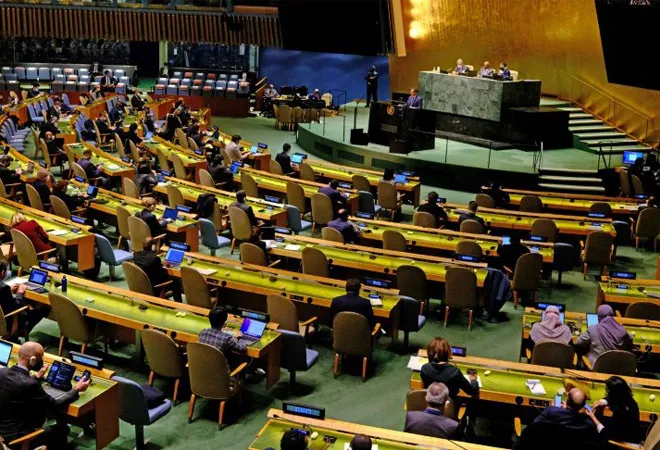
This brief is a part of The Ukraine Crisis: Cause and Course of the Conflict.
The Russian invasion of Ukraine has entered its second week and images from war-hit Ukraine continue to pour through international media. The UN Refugee agency
estimates that more than four million Ukrainian refugees will need assistance and protection in the future. Diplomats, policymakers, academics, and activists have come together to decry Russia’s “special military operation” as a blatant act of aggression against a sovereign and independent country, while Ukraine—rightfully so—has activated its right of self-defence.
Since the early days of the invasion, it became abundantly clear that the United Nations Security Council (UNSC) would be unable to deliberate upon the issue and take any form of decisive action. Russia—as a member of the permanent five—holds a veto, thereby rendering it impossible for the Council to pass any resolution on the crisis. On 25 February, Moscow
vetoed a draft resolution to end the Ukraine war, resulting in a strongly-worded criticism from Kyiv’s permanent representative.
Diplomats, policymakers, academics, and activists have come together to decry Russia’s “special military operation” as a blatant act of aggression against a sovereign and independent country, while Ukraine—rightfully so—has activated its right of self-defence.
Since the Council cannot discharge its primary responsibility of maintaining international peace and security due to a lack of unanimity between its permanent members, the UNSC voted to call an
emergency special session of the UN General Assembly (UNGA). This is a special procedure that was adopted via the
‘Uniting for Peace’ resolution, which would allow the UNGA to consider the matter and make appropriate recommendations—including the use of armed force—to restore international peace and security. This special procedure can be launched if any nine members (or more) of the UNSC vote affirmatively. After receiving 11 votes in favour of the resolution, the UNGA held an emergency special session on the Ukraine crisis between
28 February and 2 March 2022.
What is the Uniting for Peace resolution?
The Uniting for Peace resolution was
adopted in 1950 with the aim to circumvent the abuse of veto powers by the Soviet Union during the Korean War. To be sure, while the resolution itself speaks about the ability of the UNGA to recommend a range of collective measures—including the use of armed force—that are not binding in nature. The UNSC is the only organ of the United Nations that has the exclusive power to impose coercive measures, and mandate member states to adopt them. The process under the ‘Uniting for Peace’ resolution has been invoked on 10 such occasions in the past. The last two times an emergency special session was convened was in 1982, with regard to the situation involving Syria and Israel and in 1980, after the outbreak of the Soviet-Afghan war.
Scholars
debated upon what the outcome of this emergency session would be—positing that it could range from condemning Russia’s aggression, to recommending states to impose unilateral sanctions. Some of the
outcomes of previous emergency special sessions include establishing peacekeeping forces, establishing a commission of inquiry, calling for the withdrawal of foreign troops, providing assistance to refugees and requesting an advisory opinion of the International Court of Justice (ICJ). The past outcomes of this process have
stopped short of authorising a clearly-worded ‘use of force’ measure.
The resolution strongly deplores Russia’s aggression upon Ukraine stating that it is in clear violation of Article 2(4) of the UN Charter which prohibits the threat or the use of force against the sovereignty and territorial integrity of another country.
Presently, when the Ukraine crisis was being debated at the UNGA, it became increasingly clear that the resolution would in all certainty condemn Russia’s aggression. Member states representing small, developing states such as Antigua and Barbuda said that
“might does not make right”, and that it was the responsibility of the international community to speak out “lest our silence be misconstrued as consent”. The representative of Palau went so far as to call President Putin’s justification for the invasion as
reminiscent of “Hitler’s justification for the annexation of Sudetenland from Czechoslovakia in the 1930s”, and said that his actions could dismantle the rules-based world order. Many speakers pledged humanitarian assistance for the people of Ukraine, safe passage for those fleeing the country and stressed upon the importance of human rights.
On 3 March, the resolution was passed with an overwhelming majority, with 141 member countries voting for the resolution, 35 abstaining (including India, South Africa, Bangladesh, China, Armenia, and Pakistan), while five countries—namely Belarus, North Korea, Eritrea, Russia and Syria—voted against the resolution. The resolution strongly deplores Russia’s aggression upon Ukraine stating that it is in clear violation of Article 2(4) of the UN Charter which prohibits the threat or the use of force against the sovereignty and territorial integrity of another country. It demands Russia to immediately cease its use of force against Ukraine, and withdraw its military forces from the country. The resolution also condemns the involvement of Belarus in the unlawful use of force, calls upon parties to respect the tenets of international humanitarian law, and urges the immediate peaceful resolution of the conflict.
What happens next?
With the UNSC in a stalemate and given the rapid developments in Ukraine, it seemed necessary for the UNGA to discuss the matter. A similar development took place during the peak of the Syrian crisis in 2012, when the UNSC was unable to take any action due to the vetoes of China and Russia. The UNGA subsequently adopted a
strongly-worded resolution (not under the ‘Uniting for Peace’ process) by a margin of 137 to 12, with 17 abstentions. As with the present resolution on Ukraine, it was not binding—but served the purpose of expressing the abhorrence of the international community towards the situation. As dismay towards the UNSC mounted, the UNGA went a step further and
condemned the UNSC for its failure to take any action.
The UNGA resolution on Ukraine is a strong and decisive condemnation by the international community of Russia’s military onslaught on Ukraine. Maldives Foreign Minister Abdulla Shahid—currently the President of the UNGA—presided over the meeting, and stressed that the Assembly is the collective conscience of humanity. It is evident that the UNGA resolution can at best be a tool to express international censure, since it cannot mandate any binding measures which the UNSC is empowered to do under Chapter VII of the UN Charter.
The UNGA resolution on Ukraine is a strong and decisive condemnation by the international community of Russia’s military onslaught on Ukraine.
Other international institutions are also working towards exploring means to address the crisis and determine whether a process of accountability can be set in motion. The International Criminal Court (ICC) prosecutor
announced that it will be launching an investigation into Russia’s invasion of Ukraine, stating that he has “reasonable basis” to believe that war crimes have occurred in Ukraine. The ICC has jurisdiction over Ukraine, because Ukraine’s government had
accepted the ICC’s mandate in 2015. Ukraine has also
filed a claim against Russia at the International Court of Justice (ICJ), but it is unclear whether the court has sufficient jurisdictional basis to proceed against Moscow.
As pressure from the international community mounts, it remains to be seen as to whether this will be sufficient to achieve any tangible outcomes on ground. The Russian and Ukrainian negotiators
met on Thursday, with the aim to enter into ceasefire negotiations and establish humanitarian corridors for besieged citizens. With all countries calling for a cessation of hostilities and a return to diplomacy, the Ukraine crisis represents a grave and sombre question on the power, authority, and relevance of the UNSC.
The views expressed above belong to the author(s). ORF research and analyses now available on Telegram! Click here to access our curated content — blogs, longforms and interviews.




 PREV
PREV


